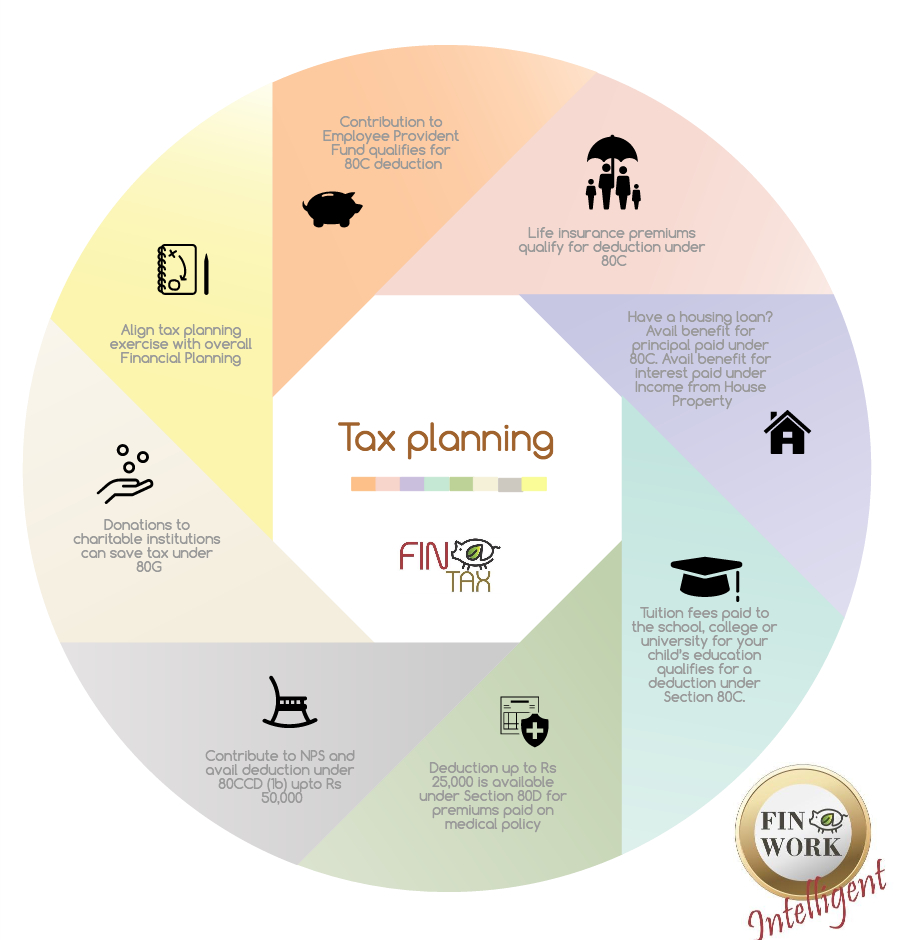While tax planning for the financial year should not be a year-end activity, most people evaluate their tax savings options only towards fag end of the financial year. The last minute rush often results into inappropriate investment decisions. The term tax planning is often construed as planning for 80C related investments. Although planning your investments to benefit from Rs 1.5 lacs deduction provided by Section 80C is a significant part, tax planning could have a much wider scope for certain individuals depending on their situation.
Tax planning is an integral part of overall financial planning and one should refrain from making adhoc investments with the objective of saving tax.
As we progress towards the end of the current financial year, its time to sit up and get your tax related papers and investments in place. Here are some pointers that can help you determine if you have planned your taxes well.

1. Check your Provident Fund (PF) contribution during the year
Employee’s contribution to a recognised Provident Fund qualifies for deduction under Section 80C. The contributions to PF during the year need to be reduced from Rs 1.5 lacs to know the balance amount, which needs to be planned for.
2. Check the Life Insurance premiums paid during the year
Premiums paid for life insurance plans are deductible under Section 80C. If you are holding certain existing policies and have paid premiums during the year, those premiums qualify for the Rs 1.5 lacs limit.
3. Do you have a housing loan?
The principal component of your home loan qualifies for the 80C benefit, to the extent it is paid during the financial year. Also, you are entitled to deduction of interest paid on the home loan. This is shown as negative income under the head ‘Income from House Property’. In case of a self-occupied property, you can claim a maximum deduction of Rs 2 lacs for interest paid during the year. However, if the property is let out, the entire interest can be claimed as a deduction until FY 17-18. After 1st April 2018, this limit is capped at 2 lacs as well.
4. Have you taken into consideration the tuition fees paid for your child?
The tuition fees paid to the school, college or university for your child’s education qualifies for a deduction under Section 80C. This is subject to the overall limit of Rs 1.5 lacs and for a maximum for 2 children.
5. Take maximum advantage under Section 80C
Even after taking into consideration the PF contribution, insurance premiums, principal repayment and children tuition fees, you may still have some shortfall. Here is where the tax saving investment comes into picture. There are various tax saving investments available viz. Public Provident Fund (PPF), National Savings Certificate, Post office Deposits and 5 year bank deposits, Equity Linked Savings Schemes of Mutual funds (ELSS), Unit Linked Insurance Plans (ULIPs), Tax Saving Bonds and Pension Schemes.
Investment in one or more of the above options should align with your overall investment planning and future goals. It should not be an adhoc investment in order to save tax.
6. Take a deduction for premium paid for mediclaim policy
A deduction up to Rs 25,000 is available under Section 80D for premiums paid on medical policy to cover self, spouse and dependent children. Further, if you pay medical insurance premium for your parents irrespective of whether they are dependant or not, you can claim an additional deduction up to Rs 30,000.
7. Contribute to NPS and avail tax benefit under 80CCD (1b)
A deduction of Rs 50,000 is allowed for investment made in National Pension Scheme (NPS). This is over and above the deduction of Rs 1.5 lacs under Section 80C. This deduction can help save tax up to Rs 15,450 for a person in the 30% tax slab.
8. Donations to charitable institutions can save tax
If you have made donations to any notified funds or charitable institutions, you may be eligible for a deduction under Section 80G. The deduction amount, whether 100% or 50% of the amount donated will be as per the provisions specified under section 80G.
9. Have you submitted all requisite bills to your company?
There are certain exemptions available for allowances forming a part of your salary, for example, exemption relating to House Rent Allowance, Leave Travel Allowance, Medical reimbursement etc. These can be claimed by submitting the necessary bills to your company.
10. Align tax planning exercise with overall Financial Planning
Comprehensive Financial Planning covers all aspects of your financial life such as financial goals, insurance, cash planning, investments and taxes. These are closely knit such that one may impact the other. Hence, tax planning should be aligned with your overall financial goals and investments.




